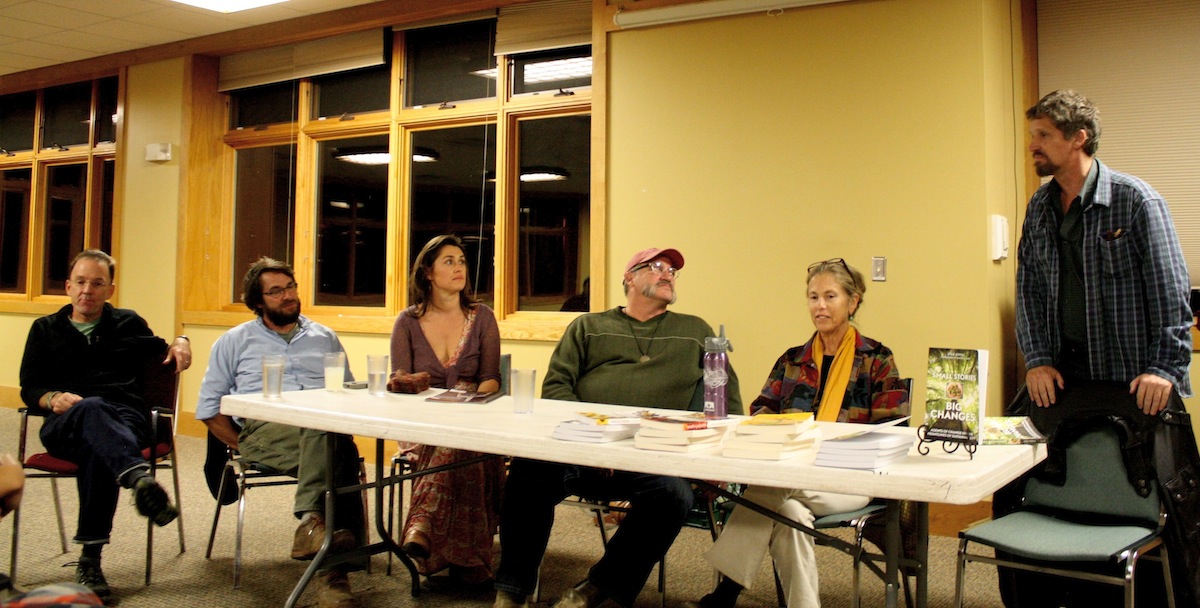A Nov. 11 Warren Wilson College panel discussion of six of the 14 contributing authors of Small Stories, Big Changes felt like watching family members argue on a sitcom.
Lyle Estill, a biofuels innovator and editor of Small Changes, has written many books on local, small-scale change with big results. Anne Tazewell is a program coordinator for the Department of Energy Clean Cities program. “I never thought I would be working for the government,” she says. Gary Phillips is an activist, poet and pastor. Eric Henry manufactures local clothes, advocating a “dirt to shirt” process, in which consumers are more connected to the fiber that makes up their garments. Megan Toben is an environmental educator and her husband Tim Toben is a green building developer.
Though they had all been asked by Estill to write about their experiences working toward sustainability in their communities, these panelists all held some obviously divergent opinions, sometimes engaging the audience and taking questions, but more often diving into back-and-forth among themselves.
After introductions Tim Toben, who had made millions in the corporate world and decided to use his earnings to invest in a major, 10-story green building in Chapel Hill, said, “I went from having $14 million and a beautiful castle on a hill, to zero dollars,” he says. “I learned that financial wealth isn’t all it’s cracked up to be.”
When the 10-story building was being built, anarchist groups in Chapel Hill opposed the structure and initially, Toben was not sure why. Green building was the new big thing. He was helping the community and the environment and these people should support him and his building, he thought.
But, after the building was foreclosed upon during the recession and after losing millions, he realized that so-called green building and the green economy is a distraction. “It’s a false promise for wealthy, liberal white people,” he says. “It’s so that they think good things are happening when they really aren’t. The 5 percent of people who are building green buildings, driving Priuses, and buying things from Whole Foods because they think that it is going to save the planet, it’s a total joke.”
Other panelists commended the green movement and the progress and gains made over the years. “Things used to be fringe, like organic food,” said Tazewell. “Because there’s been a growing awareness about health, organic food has become more mainstream. That gives me a lot of hope.”
To Estill, many changes, both cultural and legal, indicate progress and an upward trend for the planet. “Coal is dropping,” he said. “We are capable of change. This book is about changing stories to change the culture, and the culture is changing.”
But Toben warned, “Let’s not be so quick to pat ourselves on the back.” With the social, economic and environmental degradation the world is experiencing, we are on a negative trajectory, he argued, but said all hope is not lost. “It’s a promising time because we’re seeing gardens come up, communities band together, beautiful movements are happening across all sorts of lines.”
While the panelists disagreed about whether or not the government was a feasible route for change, Phillips was quick to point out that the state should not be our first and only option for progress. “The systems of oppression, that has to change in order for anything to change,” he said. “Our government is so far behind the people that it is almost always at odds with the people.”
After an hour of discussion, after several disagreements between audience members and panelists, Megan Toben expressed some discontent about how the conversation had gone. She asked the audience to stand while Phillips concluded the event by singing a song, inviting the audience to participate.
But one conclusion that all of the panelists and audience members could agree upon, as Megan Toben said, is that “you can’t just fix one piece of the system.”




Before you comment
The comments section is here to provide a platform for civil dialogue on the issues we face together as a local community. Xpress is committed to offering this platform for all voices, but when the tone of the discussion gets nasty or strays off topic, we believe many people choose not to participate. Xpress editors are determined to moderate comments to ensure a constructive interchange is maintained. All comments judged not to be in keeping with the spirit of civil discourse will be removed and repeat violators will be banned. See here for our terms of service. Thank you for being part of this effort to promote respectful discussion.